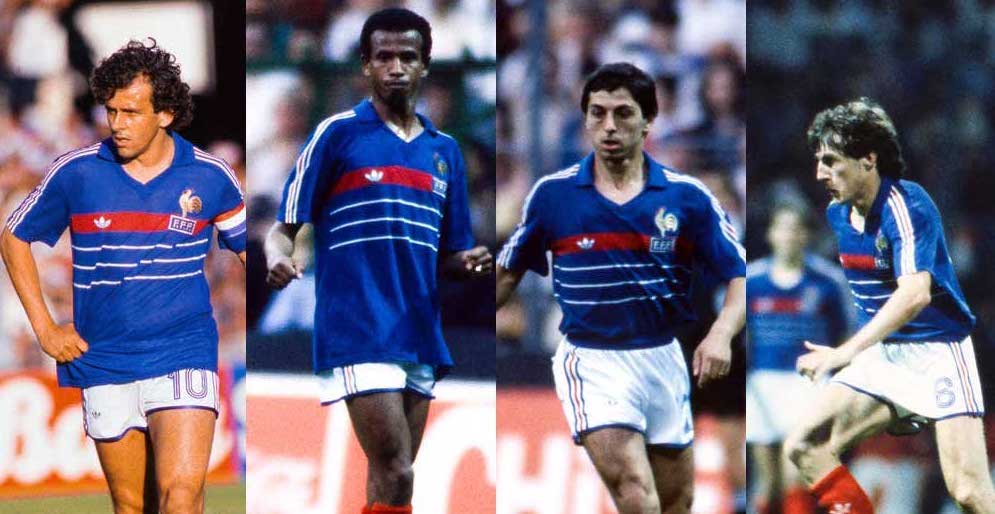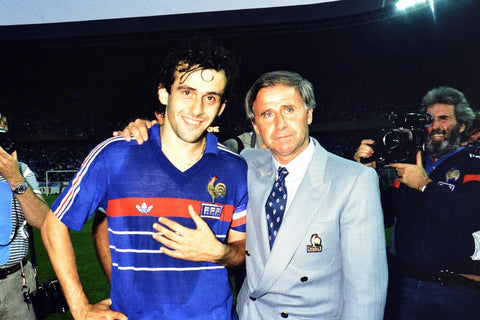
Le Carré Magique
France’s relationship with sports, specifically football, has always been a bit disjointed. The origin of this dynamic is vastly driven by historic socioeconomic division. Even the success of Just Fontaine and the national team in the late 1950’s did not upend this prejudice. There remained an overriding sentiment that academia should take precedence over sports interests.

This seems ironic given the fact that both the FIFA World Cup and UEFA European Championships were created by the French. Like Jules Rimet and the World Cup, the European Championship itself was proposed by a French gentleman by the name of Henri Delaunay in 1927. The tournament began in 1958, three years following Delaunay’s death in 1955. The trophy still bears his name today.
![]()
Le Carré Magique (for all French football fans) is considered a national treasure and a great source of pride. It all came together for the first time in February of 1984 at the Parc des Princes in a friendly against Bobby Robson’s England. It was a product of the selfless and hard-working nature of both Tigana and Fernández, coupled with the determination and finesse of Giresse to rise above his rivals.

Ultimately it gave Platini the creative freedom of expression that he needed. France's run to the semi-finals of the 1982 World Cup established Hidalgo's daring and romantic side, but he still needed a couple of tweaks to get the balance just right before winning on home soil two years later.
A move from individual talent, to a cohesive and symbiotic collective reaping the utmost reward at Euro ‘84. Michel Platini, Alain Giresse, Jean Tigana and Luis Fernandez swept all before them. This was arguably the finest midfield quartet to ever grace the beautiful game.
LUIS FERNANDEZ

The last addition to the quartet, an invaluable player at the base of Hidalgo's sparkling midfield diamond, Spanish-born Fernandez did not make his French debut until after the 1982 World Cup run. This member of Le Carré Magique missed out on a Ballon d’Or nomination during his career. Born in Tarifa, Spain, Fernandez moved to France with his parents at the age of nine. Fernandez became a French citizen in 1981, just a year before he was called up by Michel Hidalgo for Les Bleus.
The Paris Saint-Germain “barking dog” also passed with fantastic precision, not to be outdone by the more celebrated creatives before him. The youngest corner of the Carre, Fernandez was 24 at the Euro ‘84 and is perhaps best remembered for dispatching the decisive penalty two years later that saw France progress to the World Cup 1986 semi-finals, once more at Brazil's expense.
"After 1982, we were expected to win in 1984," Fernandez told BBC Sport. "We had to win, we were the favourites and France was hoping that the French football team would be the first French team to win a big international sporting trophy. Our style was typically French - a passing game with lots of movement, and getting the ball forward quickly because we had a player like Platini who could score lots of goals."
ALAIN GIRESSE

Unlike Fernandez, Alain Giresse was an international veteran of 12 years when Le Carré Magique’s moment had arrived. An amazing footballer, his goal had France on the brink of semi-final glory against West Germany in 1982 – establishing a 3-1 lead in extra time before a heartbreaking collapse to penalty shoot-out defeat. Gigi’s celebration is perhaps the most memorable ever and stuck with us to this day.
Giresse arrived at the Euro in prime form, having collected a Ligue 1 crown with Bordeaux that was retained the following season. Giresse, living up to his nickname, “Moteur,” was Platini's relentless foil. His limitless drive accentuating the quartet’s best attributes, Giresse got on the scoresheet alongside Fernandez in the 5-0 hammering of Belgium – with Platini netting a hat-trick. “He (Giresse) was a magnificent player, very intelligent with a great technique and an incredible passing ability” – Aimé Jacquet.
JEAN TIGANA

Giresse was not alone in his abundance of talent combined with a phenomenal work ethic. The World Cup-winning team of 1998 may have been held up as the role models for a generation, but it was in fact the tireless and dynamic running of Tigana that paved the way for the likes of N’Golo Kanté and Blaise Matuidi. No one could forget his slaloming run setup in extra time of the semi-final. The goal stands as arguably the defining moment of France's triumphant victory.
His long-time alliance with Giresse at Bordeaux was perfect for Hidalgo in plotting his celebrated revolutionary configuration. Tigana would make the same move to Marseille in 1989, adding two more Ligue 1 titles to the three he won on the Garonne River. A future coach of Monaco and Fulham, Tigana was indisputably among the best players in the world and finished second in the 1984 Ballon d'Or voting. But there could be, of course, only one winner.
MICHEL PLATINI

"In that tournament, Platini was unbelievable," said BBC football commentator John Motson. "I'd put him on the same level as Diego Maradona at the 1986 World Cup and Johan Cruyff in 1976. He was playing teams on his own. He was out of this world, a superstar. No team was able to contain him."
The youngsters may not know, and some fair-weathered friends may forget what a phenomenon Platini was on the pitch. With so much negative press in recent years criticizing the man himself, it would be a shame to discard what a masterful player Platini was during his prime.
A three-time Ballon d’Or winner, his ability to drift into space and dictate games from the comfort of the 18-yard box made for perhaps the single greatest individual display in the history of the European Championships. To us, Platini will forever be one of the best players ever to grace the pitch…right up there with Pele, Maradona and Cruyff.
Whilst the free-flowing movement of Le Carré Magique created the environment in which a playmaker could flourish, it was Platini’s deft touch and sublime dribbling which pushed France again onto the international scene.
The cohesive effort of Le Carré Magique (the whole being greater than the sum of its parts), enabled each player to excel in ways that the game had never seen. It was, however, Platini’s precise touch, rhythm and perfect dribbling that was the driving force behind the French team’s advancement onto the international stage.
The true beauty of Le Carré Magique was how this winning blend of technique and tenacity allowed Michel Platini to fully manifest his incredible talents. Few players have stamped their mark so indelibly over a major tournament as France's main man did in 1984. His preposterous final numbers were as follows: nine goals in five appearances, after scoring in each game of the competition from right foot, left foot and head, including two hat tricks.
From poached efforts, to delicate chips, via thumping drives and diving headers, no type of goal was beyond Platini, who won three consecutive Ballons d'Or between 1983 and 1985.
He was also a pure free-kick master. The repetition of the same inch-perfect technique he applied to almost every shot he took was fascinating.He was a phenomenon, rightly celebrated and deserving of icon status now somewhat at odds with his discredited post-career in football administration chicanery.
“What a playmaker. He could thread the ball through the eye of a needle as well as finish,” - Bobby Charlton.
Le Carré Magique was a system that proved hypnotic to witness, an opera unfolding in front of your eyes, and the protagonist was Platini. This was a midfield that was so all-encompassing that today people struggle to recall the names of France’s nominal strikers at that tournament. It had nothing to do with their strikers; it instead had everything to do with Le Carré Magique.
The Euro of 1984 was the epicentre: 1982 was too soon (and stolen from them), 1986 was a bit too late, but 1984 was an oasis of perfection for French football. No matter what the 1998, 2000, 2018 teams have done, nothing has quite matched the fluidity of that remarkable summer.

The 1998 team gave French fans the utmost victory, but we'll forever remember the brilliance and musical flow of Le Carré Magique as one of the best midfield quartets the game has ever seen. This brilliant demonstration of the beauty of the game, is a fundamental piece of the foundation for our passion for football, and the players are four of the many reasons TENLEGEND was created.
Be a TENLEGEND.
